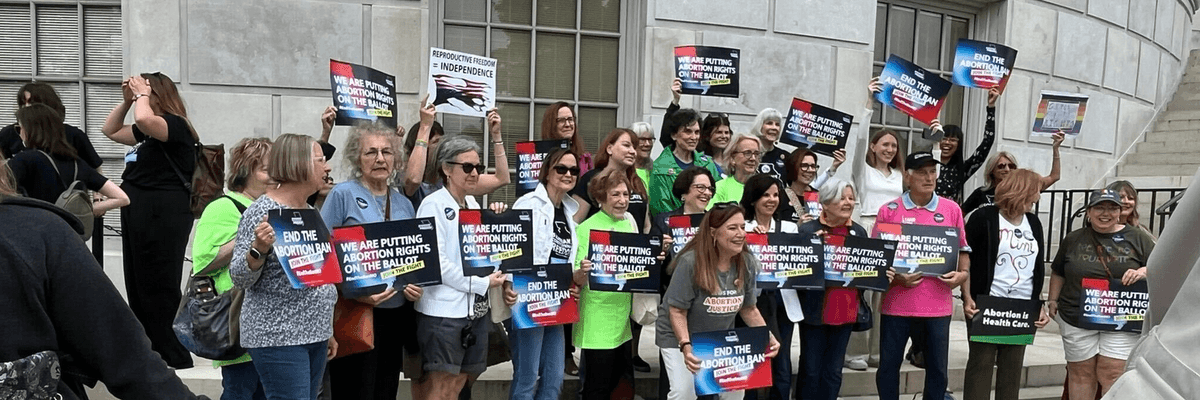Voters in at least eight U.S. states will now be able to vote on constitutional amendment ballot measures regarding abortion rights in the November elections, and in Missouri on Tuesday, organizers celebrated as they learned their initiative to place a history-making referendum on ballots had succeeded.
Missouri voters will have the opportunity to vote "yes" on the Right to Reproductive Freedom initiative, which, if passed, would make Missouri the first state to reverse its strict abortion ban through a vote by citizens.
The ballot initiative was officially certified by the Missouri secretary of state on Tuesday, three months after organizers with Missourians for Constitutional Freedom delivered more than 380,000 signatures to the state Capitol.
"This effort is a lifeline for Missourians who are now living under a senseless and cruel abortion ban passed by politicians who are deeply out of touch with voters in the state," said Kelly Hall, executive director of the Fairness Project, which helped to fund and assist Missourians for Constitutional Freedom's signature-gathering campaign. "Missourians want and need to make their own healthcare decisions without government interference. Today, Missourians for Constitutional Freedom moved voters one step closer to securing reproductive rights, and we are proud to stand with them."
Missouri's abortion ban is one of the most extreme in the nation, with the procedure prohibited in almost all circumstances "except in cases of medical emergency." The 2019 policy went into effect when the U.S. Supreme Court overturned Roe v. Wade in 2022.
"As we turn our attention to the November ballot, it's clear Missourians overwhelmingly support reproductive freedom and will have the chance to make their voices heard at the ballot box."
In addition to reversing the ban, the Right to Reproductive Freedom initiative would establish that Missouri residents have the right to make their own decisions about reproductive healthcare, including abortion, contraception, and miscarriage care.
Rachel Sweet, campaign manager for Missourians for Constitutional Freedom, said the campaign's gathering of nearly 400,000 signatures from all 114 counties in Missouri is a testament to voters' commitment to reversing the abortion ban.
"As we turn our attention to the November ballot, it's clear Missourians overwhelmingly support reproductive freedom and will have the chance to make their voices heard at the ballot box. We are ready to fight so all Missourians can take back the freedom to make their own healthcare decisions," said Sweet.
As numerous state bans have gone into effect in 2022, reproductive health clinics in bordering states that allow abortion care have been flooded with patients from other states, delaying care for Missourians, who even before the overturning of Roe frequently crossed state lines to get care. A hospital in Joplin, Missouri denied a patient an emergency abortion last year, in violation of a federal statute, because doctors were concerned that providing care would break the state law.
"Missourians have been suffering under a total abortion ban with no exceptions, leaving women and families in unimaginable circumstances," said Margot Riphagen, vice president of external affairs for Planned Parenthood Great Rivers Action. "This cruel and unjust ban has put countless lives at risk and denied people the fundamental right to make their own healthcare decisions. By passing this amendment, we can end Missouri's total abortion ban and ensure that Missourians regain access to comprehensive reproductive healthcare." "It's time to put control back in the hands of individuals," added Riphagen, "and protect the health and dignity of our communities."
Missourians for Constitutional Freedom said it would hold canvassing kickoff events on August 17 and 18 to urge people to vote "yes" on the Right to Reproductive Freedom ballot question.
On Monday, organizers in Arizona also celebrated as the state formally certified their proposed ballot measure to establish the right to abortion care in the state constitution.
Advocates in Montana and Nebraska have submitted signatures for similar initiatives and are awaiting approval.




